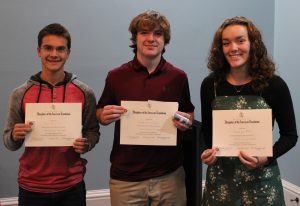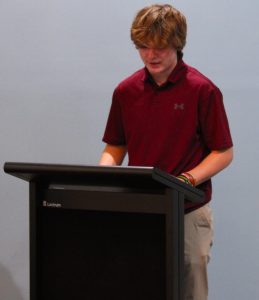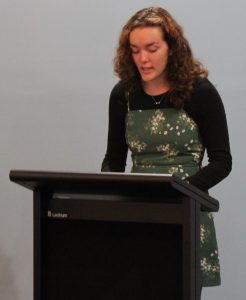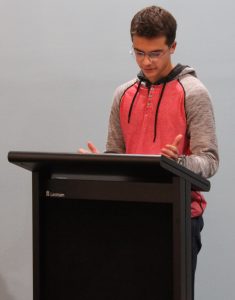Three local Clinton County students were honored as finalists for the local Daughters of the American Revolution essay contest with one student being selected for the state competition.

The Captain Harmon Aughe Chapter of the Daughters of the American Revolution, known as DAR, organization hosted a ceremony on Thursday evening to celebrate three high school seniors from Clinton Central, Clinton Prairie and Rossville for their efforts to showcase their thoughts on what makes a “good citizen.”
The three students chosen to read their essays for consideration were Douglas Newton of Clinton Central, Emerald Wallace of Clinton Prairie and Simon Wilson of Rossville. The three students came together at Ivy Tech to compose essays regarding the topic of being a “good citizen” in the United States. The essays were written using specialized computers programmed to keep the students within the writing software to encourage the flow of original thought for every essay. The stipulations prohibit the use of reference materials aside from a dictionary, which included search engines, peers, experts and more that may influence the originality of each piece. The essay is written in the presence of a faculty member or DAR member with a two-hour time limit, and the essays were restricted to 550 words or less.
“They’re not given the topic until they sit down at the computers,” Debbie Niemesh, DAR Regent, said. “This year, the topic was ‘Our American heritage and our responsibility for preserving it,’ and the focus question is ‘what are the civic responsibilities of a good citizen or why are these duties, activities and behaviors important to the shaping of the America you hope to experience.’”
Once finished, the essays were assessed by three judges not associated with DAR, and the judges were unaware of the student behind each essay. Once the judges selected the winning essay, Niemesh processed the choice and matched the writing to the student’s name and school. The essay was 50% of the total points in the evaluation for the winner of the competition, and the other factors included grades, attendance and other aspects of the student’s character that the judges dictate as indicators of a “good citizen.”
Newton, Wallace and Wilson presented their essays publicly on Thursday evening at 51 West Event Center, and Wallace was chosen as the winner of the local competition.

Newton was the first to present on Thursday evening, and he read his essay for the DAR members in attendance and the other competitors. Newton focused heavily on the influence of a “good citizen” on the world around them.
“I could continue to recite the very important parts of being a good citizen, but it can all be summarized into the main idea of how you make your country a better place for now, the future and how you preserve the past,” Newton read. “As citizens of America, we have our basic duties to society to complete our roles, whatever they may be. A good citizen is one with the mindset and determination to make the world not just a better place for themselves but for others as well.”
Newton continued to state that a “good citizen” performs acts of service and acceptance toward others without a need for recognition, and he stated that a “good citizen” acts as a role model for others rather than an individual seeking acceptance from others.
“Being a good citizen is more than caring about only yourself or comparing yourself to others,” Newton read. “It is someone who pushes their limits every chance they receive to help others and be a good citizen along with it, and it’s the only way we can grow as a country and to what would be best. We must put aside our own opinions and work in sync with those beside us to the common goal of improving our lives.”
Newton concluded by stating that the world would be dull without outstanding citizens, and the presence of “good citizens” helps create a cycle that influences others to begin performing selfless acts for others.
Wallace presented second at the meeting and focused on the core qualities of DAR, stating that a “good citizen” embodies the qualities of dependability, service, patriotism and leadership. Wallace began by describing the importance of dependability.

“When a good citizen puts these characteristics into actions, they are setting examples for everyone around them,” Wallace read. “By being dependable, you build trust in your relationship with people, such as friends, family members, coworkers and teammates. A dependable person is someone that others count on and look up to. They follow through with their promises, meet deadlines and offer their services to others when it is useful, all while being a role model to the people around them. America runs on people being dependable.”
Wallace continued to describe a “good citizen’s” responsibility to provide service, quoting the saying, “the more you put in, the more you get out.” Wallace explained that “good citizens” focus on the mantra to better the area around them, which may influence other people to act similarly in a chain reaction. Wallace continued to describe the importance of patriotism, stating that being a patriot consists of more than pride in being an American. She expressed that a “good citizen” appreciates the country regardless of whether they agree with every decision that is made by others. Wallace concluded by stating that one of the most important aspects of being a “good citizen” is having the attitude of a leader.
“Leaders embody all other aspects of being a good citizen, dependability, service and patriotism,” Wallace read. “Having and displaying these qualities is what makes a leader a leader. It is their job to provide guidance, help others and to believe in doing what is right. It is their job to take initiative to build people up and to be kind and considerate to those around them.”
Wilson was the third to present, and he focused on the difference between civic responsibilities, such as being informed voters, volunteering in the armed forces, caring for fellow citizens and more, and civic duties.

“These responsibilities are different than civic duties,” Wilson read. “Duties are activities that every citizen must carry out, such as abiding by laws, paying taxes, signing up for the draft and more. Instead, responsibilities are simply suggestions. Despite this, however, they are just as, and in some cases even more, important than our civic duties. They allow our nation and society to thrive.”
Wilson stated that without voting, a citizen allows the government to “become corrupt” and cease to represent the people, without volunteering for the military, citizens allow for the country to be unprotected from outside forces as well as internal threats, and without general care for fellow citizens, a citizen forfeits their role in creating a “free” and “great” nation.
“These often unspoken responsibilities of all of us as good citizens are vital not only to our nation’s survival but its blossoming,” Wilson read. “I hope to experience an America without injustice or inequality. Although our nation’s laws and policies protect against this, it is well known that these atrocities still occur. It is only through the responsibilities of a good citizen that ideas of racism and inequality can be vanquished.”
Wallace was awarded as the winning essay, receiving a prize of $300 and an opportunity for her essay to be assessed at the state competition that will occur at the state DAR meeting in May. Newton and Wilson received $100 for their dedication to the topic and their participation in the program. Frankfort elected not to write the essay this year.
